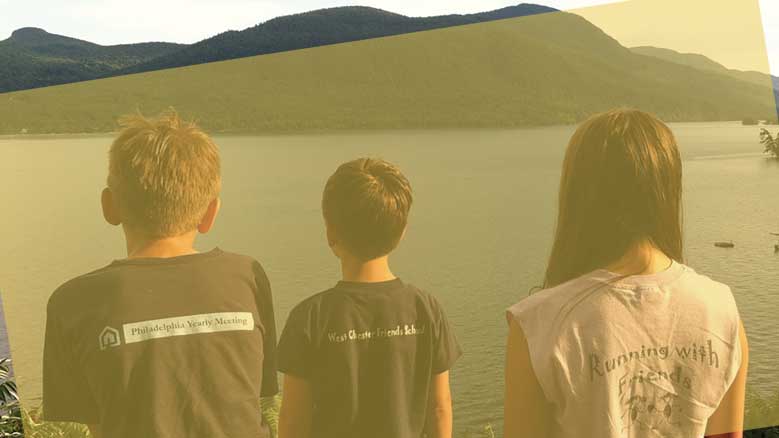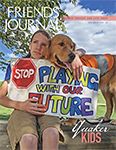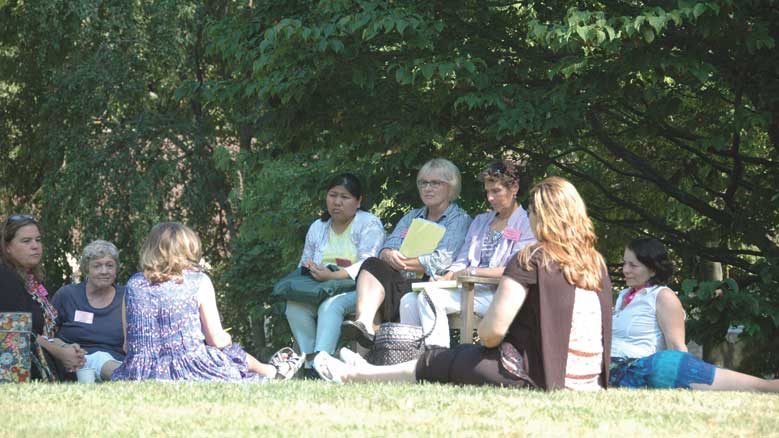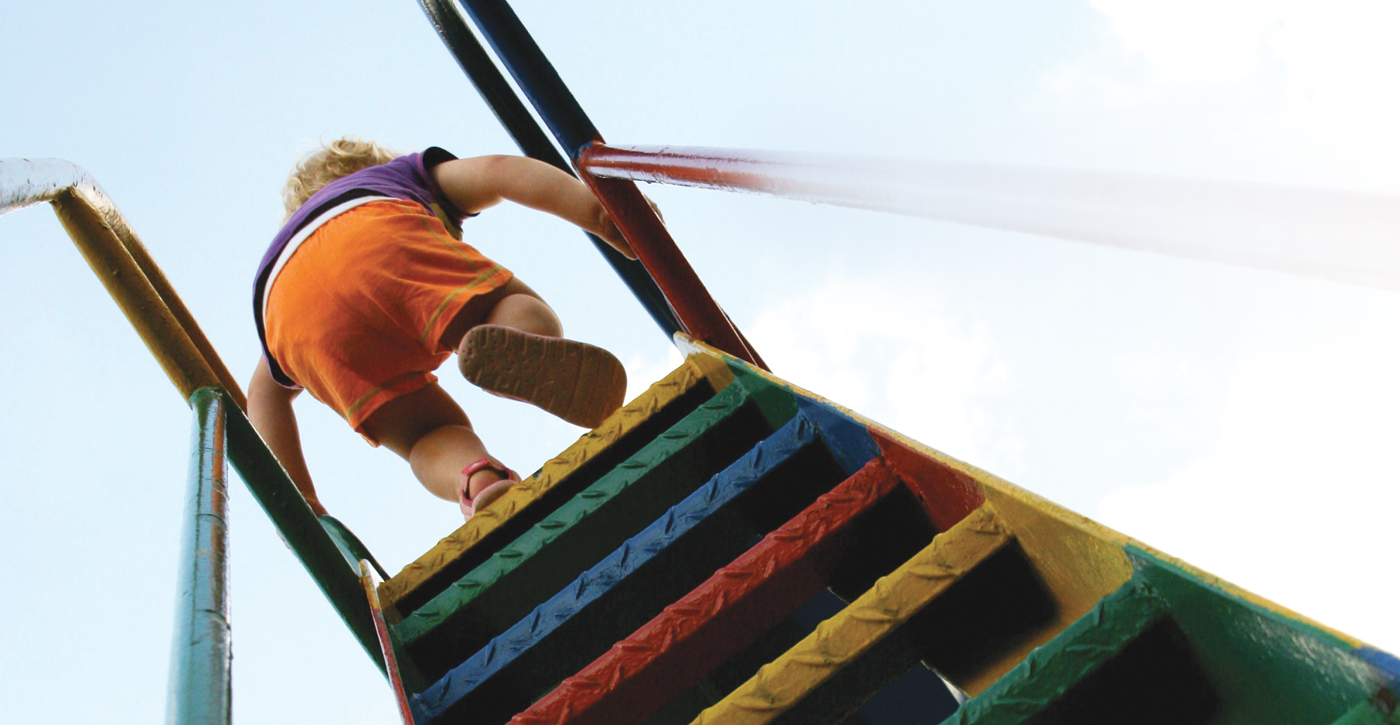Young Friends and Religious Identity

I realized that my most important colleagues all along have been my own children.
Igrew up in a small, rural meeting in Pennsylvania. My parents came to the meeting in the late 1970s with two young children, looking for a faith community for our family that aligned with their concerns for peace and justice. Since childhood, being a Friend has been at the center of my experiences of school, travel, and vocational choices. As a teenager and young adult, it did not always feel central to my identity in other communities, but it was like a current running through all my experiences.
Parenting three children with my spouse has been entwined with our Quaker faith, from choices we make at home to the commitment of worshiping and participating in the life of a meeting community. When I read about this issue focused on Quaker kids, I wondered what I might have to share, since in my work I think about children, parents, Quakerism, and Quaker kids every day. I realized that my most important colleagues all along have been my own children.
So I asked them.
What is your earliest memory about being a Quaker or going to meeting for worship?
James: What I remember specifically is not going to meeting on Sunday, but going to meeting during the week at school. I can remember being in the meetinghouse, and having this sense of like, “This is the space that I belong to,” and being able to connect with that as a little kid.
Ellie: I was a very talkative little kid, and my earliest memories of meeting are my struggle to sit still and be quiet for my school’s weekly half hour of meeting. I can remember very clearly one time in Kindergarten being scolded because I had chatted all through meeting with one of my friends. I behaved better after that. Although I struggled a little with meeting itself, I remember that from a pretty young age I identified with being a Quaker because I had a lot of friends and adults in my life who were Quakers. The feeling that I was a part of a community that cared for me and that I had something in common with was important to my identity growing up.
William: My earliest memories are when we read stories and answered wondering questions. We all know what came from those!
(William was a prolific “wonderer” as a little kid, about things related to Godly Play and Faith & Play Stories and anything else on his mind. He once hollered from his shopping cart seat in a Target store on a Sunday after meeting, “Mommy! Why can’t we see God’s face?,” which got a few stares from fellow shoppers. We wrote down many of the things he said as a small child, such as “You know what I wonder sometimes? Why I was born and what happens when we die?”)
What does it feel like, William, that you said those things?
William: I was a young prophet! (laughing) I know that I said that stuff, but I don’t remember it. It doesn’t really feel like it’s me.
What’s it like being a Quaker kid?
James: I almost feel like the question is being asked as if being a Quaker kid is more challenging, or different, than being a Catholic or Jewish kid. When I hear that question I feel like it’s my religion, so it has an impact on the way that I live my life every day. But it’s not like this outdated thing that doesn’t have the ability to connect with kids. It’s something that we’re still living and breathing every day, which doesn’t feel different from any other religion.
Melinda: Maybe I shouldn’t admit this, but I don’t really remember going to the children’s program at meeting when I was growing up. My strongest memory is sitting in meeting for worship, looking out the window, and using the bubbles in the old glass panes to magnify the rhododendron bush outside. My other memory is crawling around under the benches with my friends after worship, while our parents and the adults were next door at coffee hour. But I was in worship, and having friends at meeting is really important!
William: Yeah, I also remember crawling around under benches!
Ellie: Throughout the last 18 years of my life, I have felt very on-and-off about the extent to which I even identify as a Quaker kid. I felt very passionate about it being my religious identity when I was younger, and through middle and high school started to feel more hesitant to label myself as religious at all. What has ended up being important to me about Quakerism, and what I wrote my college essay on, are the ways in which Quaker principles have shaped me to be an activist: someone who appreciates both being silent and centering myself and also unafraid to speak up for what I believe.
What has your experience of leadership been as a young Quaker?
William: Sometimes adults still talk too much in spaces that are supposed to be for kids. In Quaker Leadership Program (QLP) at West Chester Friends School, we talked about recent issues and, of course, the climate is a major one. It caught our interest, and we decided to try to do something about it, which eventually led to the plastic bag ban in West Chester Borough. In QLP and Middle School Clerks, we use Quaker terms, and we may reflect Quaker values and practices in what we do. But neither group is about Quakerism; they are about forming a group of students to talk about their community and issues.
James: I’ve had experiences taking on leadership roles with youth programs and at school. I think that the largest thing I’ve taken away from them is a deeper understanding and, in a way, greater respect for Quaker process, especially in business meeting and clerking. I think that’s something that’s important for young Quakers to understand because when I was younger, I adamantly told you that it was a flawed system that didn’t work. But being able to step into leadership positions where I’ve had to learn about and use Quaker process, I was able to see it in action and learn to appreciate it. Not only did I get an understanding for Quaker process, but through that I got an understanding of how we as the Religious Society of Friends organize and function on a bigger level.
Ellie: I haven’t been as active in Quaker youth programs, but I have found ways to use my Quaker values to evoke change and support my communities, whether suggesting an issues debate and participating in it or being a leader in clubs and teams.
Can you share some about your experience of yearly meeting programs for children and youth?
William: The community is good. Something to be noted: a lot of introductions happen! Whether it’s your first or tenth time. So new people are always welcomed.
James: I can remember being at annual sessions as a little kid and being in the Fox group, and then I can remember being a middle school Friend and starting to have business meeting and taking on more responsibility. Young Friends are a needed voice when making decisions in the community. It’s a place where you can go and meet new people and create a lot of friendships and connections, but George Fox said that we should come together once a year to worship in community. Sometimes that gets lost.
Ellie: I have fond memories of annual sessions and family overnights. The friendships that I had with other Quaker kids growing up were really important to me, and those were the times that I could see those friends and actively share our Quaker identity together through program and play. I always felt very cared for and listened to during those programs. Experiences like epistle writing and sharing with the wider yearly meeting what my age group was doing were opportunities for me to share my voice and feel heard.
Melinda: In my job, I think a lot about how we nurture spiritual formation across childhood and adolescence and create spaces for young people to experience Quaker community in ways that are authentic and grounding. If someone grows up in a Quaker family and meeting, I wonder what spiritual tools we can help you develop? So that’s my next question.
If someone grows up in a Quaker family and meeting, I wonder what spiritual tools we can help you develop?
What are some basic things kids should know from being in a First-day program?
James: The way that I remember going through First-day school (I don’t think this is actual chronological order) is starting with a basic understanding of why Quakerism exists and why we’re Quakers. I can specifically remember asking you what makes us different from other religions, and that right there kicked off my interest and my association with Quakerism because I was able to relate to the things you told me. I was able to say, “That’s me; that’s what I believe,” and it made me want to find out more. So I would say three things: basic Quaker beliefs and where they come from, biblical literacy, and Quaker history and how that connects to today. With the Bible, I think it’s important to remember where we branch off from other forms of Christianity; where we connect; and how, while Quakers believe in continuing revelation, many people see that revelation to be about Jesus’s teachings. I remember hearing the Quaker stories in Faith & Play, and learning about Fox and Fisher and Fell. Instead of hearing them as old stories that we don’t have a way to relate to, I was able to hear them as this is where I come from and where my faith comes from, and because of that, it was so much more meaningful to me.
I think as a Quaker kid, when people at school make comments about Quakers that are stereotypes and assumptions, I’ve never found that funny. A lot of people my age have been trying to figure out what being a Quaker means to them, while I’ve had my mind made-up.
Melinda: How did it feel to be made fun of? When I was a kid and going to a Friends school in a rural area where I rode the bus with lots of other kids from other schools, I was made fun of on the bus, and called “Quaker Oats.” I remember being upset and angry about it.
James: I was called “Quacker” at a school and people thought I would take it as a joke, but it hurt. People don’t understand that it is different. While it’s not different growing up a Quaker kid, other kids have faith communities, it is being part of a much smaller religion that’s not well-known. I felt in that moment like I had to justify my identity and religion by myself.
Who’s your favorite Quaker?
James: Hmm, if I said you, it would seem like you did the interview just so I would say that. No, that’s a tough question. I’m going to have to say John Woolman.
William: William Penn.
Ellie: You.
Like many other Quaker kids, they have sat in circles and listened to stories, wondered with adults and challenged them, asked big questions and shown me that at the heart of all our exploring is love.
One of the things I appreciate about these young Friends’ unique perspectives is how they have changed and continue to evolve. At age five, Ellie told me, “Mommy, I’m a Quaker,” but she had doubts about faith at 15 that she’s still exploring. James, who had the hardest time sitting still as a child and whose behavior in First-day school was sometimes challenging, is obviously quite serious about being a Friend at 16. William, who was profoundly vocal about his spiritual life almost as soon as he could talk, identifies today as an atheist who appreciates Quaker testimonies. Like many other Quaker kids, they have sat in circles and listened to stories, wondered with adults and challenged them, asked big questions and shown me that at the heart of all our exploring is love.









How does your spouse contribute to this dialogue?
Wonderful to read the young people’s responses. I too have been raised in a Quaker family, but am the only member of a Meeting of my siblings. Maybe if we’d had a chance to go to a Quaker school instead of public schools, my sisters might be more interested. They also are married to men who are not Quakers, but share Quaker values. I worked for Philadelphia Yearly Meeting for 9 years and was a member of Upper Dublin Meeting before I transferred my membership back to Twin Cities Friends Meeting in 2001.
Fabulous article! I may have to repeat some of these queries with the Youth in my First Day class (Middle school and High School grades). As adults, we sometimes lose sight of the partners that children are in our journey of spiritual growth. This is a brilliant reminder!
This is great, I shared it with my own Quaker kid. I think she’ll relate to some of these memories.
Thank you, Melinda! What a refreshing article. I laughed to read your children’s responses on the favorite Quaker question. Thank you for uplifting the voices of youth. We needed this.
I became a Quaker when I was in my forties. I went to college in my forties and had a literature professor who had “something extra special about him. I went to his office and discovered he was a Quaker. He invited me to a Meeting. My mother had just died and I sat and wept. No one rushed to me and hug me and said, “there, there” It was beautiful to just sit there and silently have my grief. That was it for me! I am 88 and still find Meeting to be a powerful presence in my life.